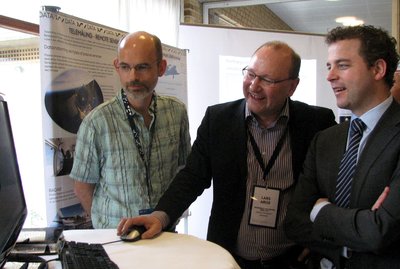Lars Arge, Professor of Computer Science at Aarhus University, has been named ACM Fellow. ACM, the largest and most highly respected professional organization in Computer Science, only grants the title to less than one percent of its 60,000 members. Five of the recipients are Danes and only two of them still reside in Denmark: Lars Arge and Christian S. Jensen. Both are in Computer Science in Aarhus. Previously, Lars Arge received the Elite Researcher award.

Lars Arge belongs to the absolute elite in his field, the design of efficient algorithms. The aim of his research is to achieve more efficient handling of the enormous amounts of data encountered in many areas.
He has lived much of his research life abroad, but basic research funding led him back to Denmark, where he has remained. He sees the basic research center he heads, MADALGO, as part of the explanation for why an internationally sought-after researcher chooses to remain in the country and draw the best minds to it instead.
- Basic research funding such as what we have in MADALGO is very important for creating a fertile research environment of high international standard. At Computer Science in Aarhus, we have two basic research centers, and that gives us a large international network, emphasizes Lars Arge.
- At the same time, being an ACM Fellow makes it easier to assemble the best team because the international scientific environment looks even more to Denmark and wants to be part of it, he explains.
MADALGO’s basic research not only attracts international interest in the research community but also generates the innovation Denmark desperately needs.
Basic research can lead to both innovation and practical application, emphasizes Lars Arge.
He is among the elite researchers whose basic research is put to use. Results from his research group were the basis for the company SCALGO that, for example, has developed methods for detailed screening of flood risk throughout the country.
- By means of I/O-efficient algorithms, we have made very accurate calculations on very detailed and therefore large terrain data for all of Denmark. We have used this to model the effects of sea-level rise and extreme precipitation, he explains.
Lars Arge sees similarly great potential in the use of advanced algorithmic techniques for handling massive amounts of data in other fields, and he works intensively with researchers in the field of biodiversity, for example.
There is no doubt that he has things under control in terms of his research and the potential of large amounts of data. But how does he handle this distinction from his colleagues?
- I'm proud of the fact that the international professional organization ACM has chosen to honor me. We can see from elsewhere that it has a self-reinforcing effect. Why do we know MIT, Stanford and Princeton? Because strong researchers we know are employed there. The ACM Fellow title helps to further strengthen our visibility, he stresses.